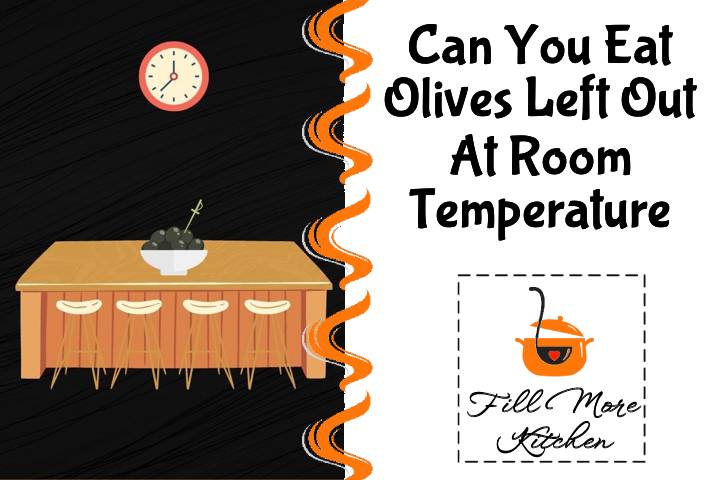Olives are commonly used in various dishes like salads and pasta. In case you accidentally left them out overnight during a late-night dinner party, you might be wondering if they are still safe to consume or if you should discard them.
If you don’t live in a hot and humid area, it’s generally safe to eat olives that have been left out overnight, but it’s not recommended to leave dry, fresh, or marinated olives at room temperature. However, if it only happens once and the temperature isn’t too high, they’re likely still safe to eat.
It is important to thoroughly examine the olives before consuming them and if there is any uncertainty about their edibility, it is advised not to eat them.
Are there distinctions between black and green olives? And what about brine-cured olives? Discover the answers to these inquiries and more in this article.
What Happens If Olives Are Left Out Overnight?
The effect of leaving olives at room temperature overnight can differ depending on the type of olives you have.
Olives that are soaked in oil, marinade, or bought from the deli counter are generally not considered stable at room temperature once they have been opened, according to most experts. Nevertheless, olives prepared using the traditional Mediterranean approach can be kept at room temperature without any issues.
Olives can be preserved in various ways, with the most popular methods being:
- Soaked in oil
- Marinated
- Pickled
- Brine
Olives that are commonly found in delis are typically soaked in oil or marinated with various seasonings such as garlic and onion. Nevertheless, these olives lack the preservation compounds present in other methods of preservation and are not aged.
If olives are left out at room temperature, they can become soft and unappetizing due to the growth of bacteria in the marinade, which can cause illness after a few hours. Additionally, the olives will develop an unpleasant fermented taste and may taste moldy or musty.
Preserving olives can be done by either brining or pickling them, where the former involves immersing the olives in a salty mixture and allowing them to mature for several months, while the latter requires placing the olives in large ceramic jars and covering them with abundant salt to create a brine solution.
Olives that are salted and left in a dark corner with a lid will ferment over time, turning into a pickled substance that can be safely consumed at room temperature. These types of olives can be found at specialized traditional Italian markets or some specialized supermarkets.
Olives can be stored at room temperature for up to 6 months, provided the temperature is below 65 degrees Fahrenheit (18.3 degrees Celsius) and they are kept away from direct sunlight.
Is There a Difference Between Green and Black Olives?
Although black and green olives come from the same fruit, their level of ripeness is what sets them apart, with green olives being unripe fruits and black olives being fully ripe fruits of the olive tree.
The primary difference between green and black olives is their flavor. Black olives are typically sweeter and infused with sweet wines, making them a great match for rich dishes. On the other hand, green olives have a more bitter taste and are commonly used to produce olive oil, which pairs well with savory meals.
Olives, whether cured in brine or marinated in oil or water, have comparable shelf life and nutritional value with similar fat content.
Can You Get Food Poisoning From Olives Left Out?
Olives, like any other food that can cause food poisoning due to the development of E.Coli, Chlodistrium, or other toxins, are not prone to spoilage when left out at room temperature.
The edibility of olives left out at room temperature depends on their preservation method and duration. It is advisable to assess the quality of the olives before consuming them after four hours.
Olives have a longer shelf life compared to other foods, particularly when they are stored in brine, due to their low sugar content that inhibits spoilage; however, specific conditions can cause them to spoil.
- If the temperature in the room exceeds 75 degrees Fahrenheit (24 degrees Celsius)
- Olives soaked in water
- Olives immersed in other dishes
- Dry olives
- Fresh olives
- Cross-contamination
- An open jar or container without a lid
Through a process called “osmosis,” bringing replaces the cell membrane of food, which involves drawing out water and bacteria and sealing the cell membrane in a salt solution; salt, which was commonly used as an early form of toothpaste, is a natural antiseptic/antibacterial substance.
As long as your olives are correctly prepared in a brine solution, they will not go bad when left at room temperature, so you don’t have to worry about getting sick. Nevertheless, dry olives or those that are combined with other foods can spoil if kept at room temperature.
Olives stuffed with cheese, garlic, or capers should not be left out at room temperature as they have a shorter shelf life and are likely to develop bacteria if left for two hours.
Olives, whether dry or fresh, should not be kept at room temperature for more than 4-6 hours before being refrigerated. Although dry olives may contain oil or marinade, they are not preserved and are classified as dry. Without a preservative like salt brine, they can harbor harmful bacteria that can lead to food poisoning.
How Can You Tell If Olives Have Gone Bad?
The smell of olives is the most effective way to detect their spoilage, as they emit a musty, moldy, or unpleasant odor when they go bad. Additionally, spoiled olives may become mushy or soft and develop black or brown spots. In the case of black olives, they may give off a vinegar-like scent and acquire a syrupy texture.
Green and black olives exhibit comparable signs of spoilage, typically resulting from aging or contamination, which leads to their disintegration and unpleasantness.
If you observe that your olives have lost their original shape, it could indicate that they have gone bad. Additionally, if they crumble upon contact with a tool, it indicates that their composition is deteriorating.
Remember that olives may seem mushy but that doesn’t necessarily mean they are spoiled, even if you can easily break them with a utensil.
If your olives have a moldy smell, it is not safe to eat them as it means they are growing mold or fungal spores, which can cause severe reactions despite some molds being harmless in small amounts.
Harmless molds can still be dangerous if consumed in large amounts due to the presence of mycotoxins, which can damage the body’s nervous system and lead to organ failure, including the liver and kidneys.
If you want to avoid the growth of mold and fungus in your olives, it is recommended to store them in a cool place. It is important to keep olives that are stored in brine away from heat sources such as ovens. In case of dry, fresh, or unpreserved olives, it is advisable to refrigerate them.
It is important to cover all olives and refrain from touching them with your hands to prevent cross-contamination, which is the primary cause of food poisoning. To ensure safety, use a clean utensil and cover the olives after each use.
Should Olives Be Refrigerated After Opening?
Olives that are dry or marinated need to be stored in the refrigerator once opened. Nevertheless, if they are appropriately pickled or preserved in brine, they can be kept at room temperature for a maximum of six months. The correct way to store olives depends on the preservation technique and the surrounding conditions.
It is advisable to refrigerate a jar of olives after opening, especially if the manufacturer suggests doing so, when purchased from a nearby grocery store.
Refrigeration can increase the longevity of your olives, particularly in regions where the temperature frequently exceeds 80 degrees Fahrenheit (27 degrees Celsius). It is essential to ensure that the storage area for brine olives is cool and dry.
Brine olives are ideally stored in a basement or cold cellar that maintains a temperature range of 50-70 degrees Celsius and low humidity levels (10-21 degrees Celsius); if the area is damp, consider utilizing dehumidifiers to maintain dryness.
If you have concerns about the temperature or humidity of your surroundings, it is advisable to store your olives in the refrigerator to avoid spoilage and the potential growth of dangerous bacteria.
How Long Does an Open Jar of Olives Last?
Refrigerated olives can remain fresh for a period of 12-18 months if they are stored and handled correctly. If the olives are properly cured and prepared, they can be kept in a cool and dry place for up to two years. The most crucial factors for storing olives are appropriate food handling and temperature control.
Leaving your jar of dry or marinaded olives at room temperature for a long time can reduce its longevity, so it’s crucial to store them in an appropriate setting to avoid the growth of mold and bacteria.
If you are unsure about the appropriate way to store your olives, it is advisable to adhere to the manufacturer’s instructions. In the absence of any specific instructions on the packaging, you should follow these basic guidelines:
| Type | Refrigerator | Shelf/room temperature |
| Dry or Fresh Olives | 12-18 months | 4-6 hours |
| Marinated w/ other ingredients | 6-12 months | 2-4 hours |
| Brine/pickled olives | 2 years | 2 years |
How Should Olives Be Stored?
If the instructions indicate refrigeration, then olives must be kept in the fridge. For those stored on shelves, it is crucial to cover them adequately and keep them away from sunlight and heat. Regardless of how they are prepared, all types of olives require cool and dry surroundings.
It is important to store your olives in a container with a tight-fitting lid to prevent spoilage. If the original jar is lost or broken, it should be replaced with a sealed container made of plastic, glass, or ceramic. In the absence of a proper lid, cover the container with plastic wrap or tin foil.
If you prepare olives in brine at home, it is advisable to utilize a spacious ceramic container specifically designed for this purpose. Avoid using plastic or metal containers for extended storage as they may interact with the acidic brine and pollute the olives after several months of preservation.
Can You Store Olives in the Freezer?Â
If stored in a well-sealed container or bag, olives can be kept in the freezer for 2-3 years, but it is advisable to consume them within six months to ensure their freshness and quality as they tend to become mushier and may degrade over time when frozen despite being resilient fruits.
Freezer-safe, zipper-sealed bags or freezer-stable plastic or glass containers are both effective options for storing dry and fresh olives.
Olives that have been cured in brine are best stored in the freezer, and can be kept in a glass container with the brine solution to maintain their structural integrity and flavor.
You can also check this video about “Can You Eat Olives Left Out At Room Temperature?”
Check out our top 10 reviews!
Related posts
https://fillmorekitchen.com/how-long-can-you-keep-tap-water-in-the-fridge/
https://fillmorekitchen.com/what-you-should-and-shouldnt-clean-your-microwave-oven-with/
https://fillmorekitchen.com/9-reasons-your-instant-pot-is-getting-the-burn-error-and-how-to-fix-it/
https://fillmorekitchen.com/are-halogen-ovens-worth-it/
https://fillmorekitchen.com/how-long-does-cooked-shrimp-last-in-the-fridge/



